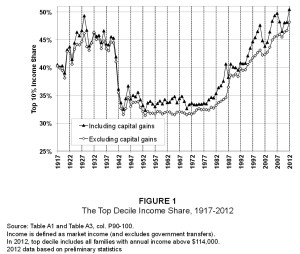Wealthiest having much easier time bouncing back from recession
Posted: September 12, 2013 Filed under: General, Income, Politics Leave a comment »A new study by Emmanuel Saez at U.C. Berkeley says that the economic recovery has been far more generous to the wealthiest Americans than to the rest of the country. From 2009-2012, according to the study, incomes of the top 1% of Americans grew by 31.4% while the incomes of the other 99% grew just 0.4%. This chart from study shows what percentage of the total income share was held by the top 10% (decile) from 1917-2012.

Source: “Striking it Richer: The Evolution of Top Incomes in the United States” by Emmanuel Saez, UC Berkeley
As you can see, there was a serious drop-off around the time of World War II, and the levels stayed fairly constant between 30-35% until the late 1970s. They’ve now climbed back up to an all-time high.
The study was a topic of discussion today on the Diane Rehm Show on NPR. You can listen to that conversation here.
Stephanie Coontz of the Council on Contemporary Families said on the show that this is a long-term change.
“I think it’s a mistake to just think of it in terms of the recession,” she said. “It’s actually a 30 year process that has turned around all of the trends we had after the Great Depression and the move toward greater equality, and greater sense of community among the rich as well as the poor. I think the social implications of this are profound at all levels of society.”
Wall Street Journal columnist Dante Chinni, who directs the American Communities Project at American University discussed the causes of the growing disparity.
“You have the decline of good paying jobs, of manufacturing jobs,” he said. “And they were hard jobs, but they paid well. And they’ve disappeared. And that’s made life very hard. Also, automation. There are just fewer jobs available for people who don’t have a lot of education, and a lot of good skills training.”
The show’s other guest Columbia University journalism professor Thomas Edsall recently wrote a blog post for the New York Times on whether the government can actually do anything about inequality. On a somewhat related note, economist Steven Lanza looked at the issue of what difference government policies can make on the economy in Connecticut. His answer: not much. A WSHU story on his paper is here.
Also today, NPR Morning Edition’s Steve Inskeep spoke with Tyler Cowan, author of the book “Average Is Over: Powering America Beyond the Age of the Great Stagnation.” Cowan predicts the future means more people rising up to much greater wealth, as well as more clustering in a kind of “lower-middle class existence.”
“It will be a very strange world, I think,” he said. “We will be returning to historical levels of inequality. We’ll view post-war America as a kind of strange interlude not to be repeated. It won’t be the dreams that we all had that virtually all incomes go up in lockstep at three percent a year. It hurts to give that up. It will mean some very real increases in economic fragility for a lot of people.”
You can listen to Cowan’s conversation with Inskeep here.
What do you think? Let us know in the comments, email disparity@wshu.org or tweet us at @CTdisparity.

Recent Comments